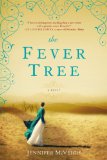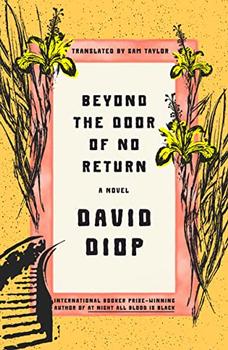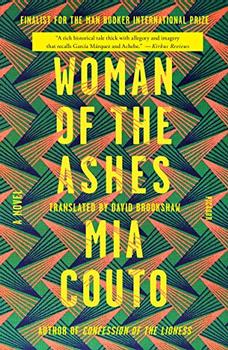Summary | Excerpt | Reading Guide | Reviews | Beyond the book | Read-Alikes | Genres & Themes | Author Bio

Critics' Opinion:
Readers' Opinion:
First Published:
Apr 2013, 432 pages
Paperback:
Feb 2014, 448 pages
 Book Reviewed by:
Book Reviewed by:
Sarah Sacha Dollacker
Buy This Book
Jennifer McVeigh's breathtaking debut novel The Fever Tree is both an engrossing historical tale and a coming-of-age story. Frances Irvine has been raised like a hothouse flower: privileged and adored. She has been educated to play the piano and draw pictures. Her father, a wealthy Irish merchant and an outcast of upper-crust English society, has tried to nurture in Frances the qualities that will help her have the life he could never achieve. When he dies suddenly, burdening Frances with great debt, she is left with the option of becoming the nurse to her young cousins in Manchester or leaving England for South Africa where Dr. Edwin Matthews, whom she knows from childhood, is keen to marry her. Her upbringing has prepared her for neither life, but the thought of raising her cousins in the poverty-plagued depths of Manchester leaves her stricken. With hesitation and fear, she boards a steamer for South Africa. On board she meets William Westbrook, a charming rogue, who flirts with her and speaks well of her father. The naïve Frances is misled by William's panache and personality, and resents her looming marriage to Edwin.
Thus begins The Fever Tree, a captivating novel set against the diamond industry in Kimberley, South Africa in the late 19th century. Though it is primarily occupied with Frances's awakening and maturation, McVeigh fills the story with large historical questions: What was the nature of colonization in South Africa? Why did the Europeans choose to subjugate native peoples in such a harsh manner? Finally, how was European dissent about colonization handled by other Europeans? McVeigh provides an astute, and full-bodied description of colonization in South Africa. William represents the opportunistic Englishman, comfortable using brutality to turn a profit. He sees native Africans as instruments for his own gain. In contrast, Edwin Matthews stands for the progressive European who speaks against native subjugation. He believes Africans have their place, but that they should be granted the minimal respect allowed to any human being.
Outside William and Edwin's dichotomy is Frances, whose educational path parallels the reader's. Just as many of us do not know the intricacies of 19th diamond mining, or how native Africans were treated during this period, Frances is similarly unenlightened. As she discovers the realities of the diamond mining operation in Kimberley, truths that many want hidden from the wider world, we discover them as well. This process is enhanced by McVeigh's narrative structure. Much of the novel is told in free indirect discourse (or FID), a combination of first and third person narrative voice that allows for a seamless transition between character and narrator.* An example from the novel:
Would a doctor from the colonies really be presumptuous enough to flirt with her? She didn't imagine he had found himself there by mistake. He didn't look like the kind of man who did things carelessly or by mistake.
This blurred line between character and narrator enables a deeper understanding of both the character and the story, but it can also mislead; it allows for an unreliable narrator as Frances exemplifies. Because of McVeigh's artful use of FID, the reader is given the opportunity to deeply engage in the novel's debates - both social and personal. For example, Frances's impressions of Edwin and William can easily be taken as factual representations, but just as Frances struggles to determine which suitor is the cad and which is the hero, the reader struggles too and must work to come to a verdict. Although Francis's decisions are not always sympathetic, we nonetheless feel for her because McVeigh has wrapped us so tightly into her story.
At the beginning of The Fever Tree, Frances is not a likeable character. She is haughty, silly, and obsessed with appearances. However, despite her father's encouragement to be a woman of society, a synonym for a useless person, she has grit. The title of the novel, which refers to an actual tree that grows in the Karoo, the area where Frances first lives when she arrives in South Africa, suggests Frances's inner strength. The fever tree is magnificent, with yellow limbs and broad foliage. It needs more water than the native plants, but during severe drought it will draw water from its outer limbs to provide nourishment for the trunk and roots. The process of finding inner strength, of tending to the absolute necessities in the face of hardship, becomes a metaphor for Frances's journey. She begins life as a beautiful plume, a useless ornament. Yet, by the end of her struggles, she has learned to draw deep into herself for the resources that will help her, rather than relying on the superficialities of life that will not.
McVeigh's novel is entrancing and provocative. It is a beautiful character drama and an insightful historical representation. This novel is not to be missed.
*Free indirect discourse (also known as free indirect speech) is a combination of first and third person narrative voice that allows for a seamless transition between character and narrator.
Jane Austen is often considered the originator of the technique. Here is an example from Sense and Sensibility:
"Mrs John Dashwood did not at all approve of what her husband intended to do for his sisters. To take three thousand pounds from the fortune of their dear little boy, would be impoverishing him to the most dreadful degree. She begged him to think again on the subject. How could he answer it to himself to rob his child, and his only child too, of so large a sum?" (122)
![]() This review was originally published in The BookBrowse Review in June 2013, and has been updated for the
February 2014 edition.
Click here to go to this issue.
This review was originally published in The BookBrowse Review in June 2013, and has been updated for the
February 2014 edition.
Click here to go to this issue.

If you liked The Fever Tree, try these:

by David Diop
Published 2024
The hotly anticipated new novel by David Diop, winner of the International Booker Prize.

by David Brookshaw, Mia Couto
Published 2019
The first in a trilogy about the last emperor of southern Mozambique by one of Africa's most important writers.





The House on Biscayne Bay
by Chanel Cleeton
As death stalks a gothic mansion in Miami, the lives of two women intertwine as the past and present collide.

The Flower Sisters
by Michelle Collins Anderson
From the new Fannie Flagg of the Ozarks, a richly-woven story of family, forgiveness, and reinvention.

The Funeral Cryer by Wenyan Lu
Debut novelist Wenyan Lu brings us this witty yet profound story about one woman's midlife reawakening in contemporary rural China.
Your guide toexceptional books
BookBrowse seeks out and recommends the best in contemporary fiction and nonfiction—books that not only engage and entertain but also deepen our understanding of ourselves and the world around us.